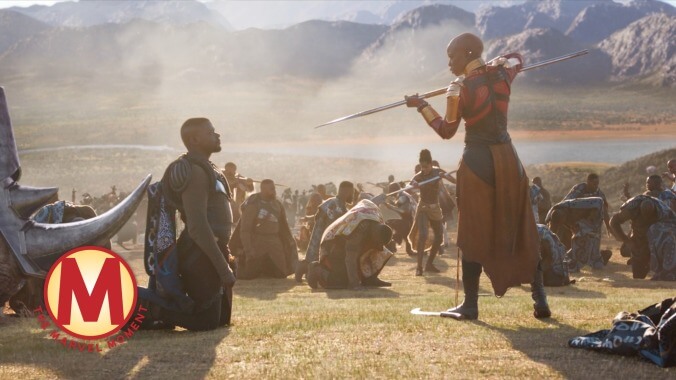Black Panther finally made the women of the MCU equally capable heroes


From the minute Black Panther officially assumed its place on the MCU release slate, it was destined to usher Marvel into somewhat uncharted territory. Sitting at the helm of the studio’s first film with a majority black cast, director Ryan Coogler already faced an immeasurable pressure to present something totally new. How did he fare? Pretty well: Black Panther broke scores of box-office records upon its release, secured a global billion-dollar haul, introduced one of Marvel’s most compelling villains to date, and continues to resonate as one of the studio’s best, most magnetic movies. Part of what makes this installment different from its predecessors actually has little to do with T’challa (which is not a dig at the effortlessly charismatic Chadwick Boseman): For once, a male hero was surrounded by women who were empowered to be just as capable, effective, and viable as him. The young king might have saved the day in the end, but his victory wouldn’t have been even remotely possible without the guidance and strength of warriors like Okoye.
Coogler brilliantly encapsulated this sentiment in a brief glimpse during Black Panther’s climactic final battle, when Okoye (Danai Gurira) saves M’Baku (Winston Duke) from certain peril. As W’Kabi (Daniel Kaluuya) charges forward on an armored rhino, Okoye steps in front of the Jabari leader with remarkable certainty, just in time to save his life and receive an affectionate lick from the animal. She and her love face off, and even as W’Kabi tries to manipulatively weaponize their relationship, she remains stalwart in the name of her homeland. As he takes a look at the battle raging around him—where the men are flagging at the hands of Nakia (Lupita Nyong’o), Shuri (Letitia Wright), and the Dora Milaje—he recognizes that he is bested and, without further strife, drops his weapon and actually fucking kneels before her. The rest of the Border Tribe immediately follow suit in acknowledgment of the women’s power.
Up to this point, the MCU had presented strong female characters, like Natasha Romanoff and Wanda Maximoff, only to minimize or grossly objectify them—or in the case of Scarlett Witch, find their power regarded as a liability. Black Panther, on the other hand, takes every opportunity to remind the audience that the women are the backbone of Wakanda. If you’re ever in doubt of this, just look to Shuri’s decked-out lab or to Nakia, whose overarching vision of empowering black people globally with Wakanda’s wealth of resources encourages T’challa to build a school in America. (And she’s figured out a way to do so without amassing an unnecessary body count. Imagine that, Erik.) These characters’ unfettered power and the support of the men around them was on a level that we had not yet seen within the MCU, and it points to Marvel’s readiness to move into a much more inclusive future. With Okoye, Nakia, and the arrival of Carol Danvers and soon Shang-Chi, Marvel Studios’ next chapter will give fans from more marginalized groups the opportunity to actually see themselves as heroes and genuine equals.
GET A.V.CLUB RIGHT IN YOUR INBOX
Pop culture obsessives writing for the pop culture obsessed.